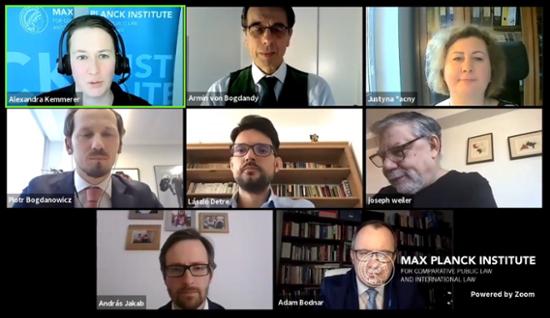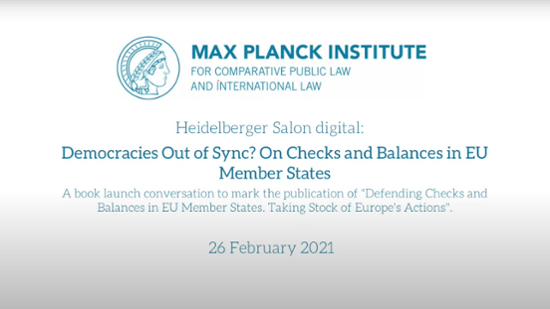You are here: Institute The Institute Berlin Office Events Heidelberger Salon HD Salon 26.02.21

It was only the second in our series of digital Heidelberger Salons – but from a technical point of view, something of a routine had already set in when prominent scholars of EU law gathered to discuss the rule of law in the European Union on 26 February 2021.
The event’s occasion was the publication of “Defending Checks and Balances in EU Member States. Taking Stock of Europe's Actions” (Springer 2021), a book co-edited by several of MPIL’s researchers. Accordingly, the panel of the Heidelberger Salon digital: Democracies Out of Sync? On Checks and Balances in EU Member States was composed mainly of contributors to the book:
Among the panelists were not only co-editors Armin von Bogdandy (MPIL) and Piotr Bogdanowicz (University of Warsaw), but also authors Justyna Łacny (Warsaw University of Technology) and Joseph H. H. Weiler (NYU). Additionally, András Jakab (University of Salzburg) and Adam Bodnar, the personally affected Polish Commissioner for Human Rights, contributed to the discussion. Alexandra Kemmerer (MPIL) moderated the panel and subsequent Q&A session, for which around 50 further participants had registered.
Setting the scene for the event, Piotr Bogdanowicz and Armin von Bogdandy gave a brief overview of the book and presented the context and agenda of their research. Adam Bodnar and András Jakab built on this to delve deeper into the specific situations in Poland and Hungary, respectively. Justyna Łacny explained the functioning of a device meant to halt rule-of-law-backsliding in member States: the recently established conditionality mechanism. Adopting a bird’s eye view, Joseph Weiler closed the first round of statements by assessing the overarching structural and systemic challenges posed by current developments.
In the subsequent Q&A, insightful and sometimes provocative questions were raised: Is the imposition of democratic standards in European external relations legitimate if the EU itself is struggling with the rule of law in member States? Should the state of democratic representation in the EU really be assessed with criteria stemming from national contexts? How does the legality of previous conditionality rules reflect on the novel mechanism?
The ensuing discussion was concluded with a final round of statements by the panelists. Here, the diverging outlooks crystallized – while some proved rather pessimistic, others drew hope from the relatively high level of trust EU institutions enjoy. On one thing, however, everyone could agree: The importance of international collaboration, academic and otherwise, in influencing these developments.
Report: Jakob Hach
via Zoom / Livestream

By loading the video, you accept YouTube's privacy policy.
A recording of the event is available at https://www.youtube.com/watch?v=37Vw1aap4fs. In a premiere for the series, the Heidelberger Salon digital was also livestreamed via Verfassungsblog and Völkerrechtsblog.